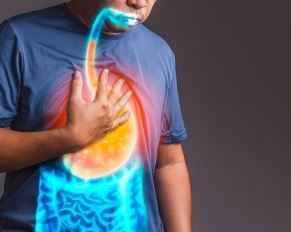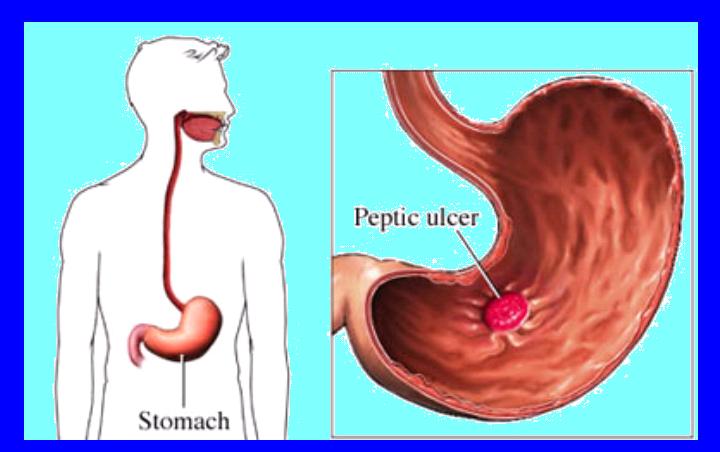Most people know it as ‘heartburn,’ but the medical term for it is gastroesophageal reflux disease (GERD). GERD is a…


Most people know it as ‘heartburn,’ but the medical term for it is gastroesophageal reflux disease (GERD). GERD is a…
 Good digestion is vital to good health. Your digestive system is important because it’s where important nutrients your body needs to thrive are absorbed. Sadly, digestive problems have been on the rise ever since the food manufacturing industry learned to process foods for more bulk and longer shelf life. The modern American diet is sorely lacking in means of keeping our digestive systems working optimally. Processed foods can spike blood sugar, and they often contain little nutritional value. Additionally, today’s busy families often don’t sit down to dinner together for what used to be known as a ‘home-cooked meal.’ What often results is parents and children alike often reaching for quick foods that are ready fast and don’t provide nutrients necessary to keep the digestive tract, as well as all the other systems of the body, healthy and functioning properly. In fact, processed foods that are bad for digestion rarely are satisfying for the simple reason that they provide no value to your body, making you consume more and more of them to feel full. Following are some valuable recommendations from GI doctors in Flushing on how you can improve your digestion and begin feeling better almost instantly! For more help with your digestion contact a top GI doctor near you.
Good digestion is vital to good health. Your digestive system is important because it’s where important nutrients your body needs to thrive are absorbed. Sadly, digestive problems have been on the rise ever since the food manufacturing industry learned to process foods for more bulk and longer shelf life. The modern American diet is sorely lacking in means of keeping our digestive systems working optimally. Processed foods can spike blood sugar, and they often contain little nutritional value. Additionally, today’s busy families often don’t sit down to dinner together for what used to be known as a ‘home-cooked meal.’ What often results is parents and children alike often reaching for quick foods that are ready fast and don’t provide nutrients necessary to keep the digestive tract, as well as all the other systems of the body, healthy and functioning properly. In fact, processed foods that are bad for digestion rarely are satisfying for the simple reason that they provide no value to your body, making you consume more and more of them to feel full. Following are some valuable recommendations from GI doctors in Flushing on how you can improve your digestion and begin feeling better almost instantly! For more help with your digestion contact a top GI doctor near you.
 Constipation is a problem for many people, it is something that can have a direct impact on our overall health and can also cause long term damage to our bodies. Constipation can be a sign of an unhealthy diet or stress or that you aren’t getting enough water or it can be a sign of another medical condition. If you are constipated often you should go to a gastroenterologist in Flushing and get a check up.
Constipation is a problem for many people, it is something that can have a direct impact on our overall health and can also cause long term damage to our bodies. Constipation can be a sign of an unhealthy diet or stress or that you aren’t getting enough water or it can be a sign of another medical condition. If you are constipated often you should go to a gastroenterologist in Flushing and get a check up.
The recent death of character actor, Abe Vigoda, caused the media to haul out sound bites and videos of some of his most memorable scenes. Of course, there was dialogue of Vigoda playing Tessio in “The Godfather”, as well as his character Fish in the “Barney Miller” series. But oddly enough, many of the sound bites and still shots of Fish in “Barney Miller” had that character’s hand dipping into a box of prunes while extolling their virtues. He said “I’ve been eating prunes for 40 years. When I was 13, I gave a girl a necklace of prune pits. Her mother thought I was into voodoo.”
 A stomach ulcer occurs when areas of the lining of the stomach or small intestine become eroded or worn away. Stomach ulcers can be very painful. They can also cause additional symptoms, including nausea, vomiting, bloating, and loss of appetite. Stomach ulcers can even lead to more serious medical conditions, including cancers of the stomach and digestive system. There are a number of known contributors to the development of stomach ulcers. These include poor diet, bacteria known as H. pylori (helicobacter pylori), use or overuse of non-steroidal anti-inflammatory drugs (NSAIDs), consuming products with caffeine or carbonation, smoking, and excessive alcohol use. But there is good news about stomach ulcers. They are largely preventable. In many instances, all it takes is a little behavior modification here and there to reduce your risk of developing a stomach ulcer. Here are some tips from gastroenterologists on how to prevent stomach ulcers.
A stomach ulcer occurs when areas of the lining of the stomach or small intestine become eroded or worn away. Stomach ulcers can be very painful. They can also cause additional symptoms, including nausea, vomiting, bloating, and loss of appetite. Stomach ulcers can even lead to more serious medical conditions, including cancers of the stomach and digestive system. There are a number of known contributors to the development of stomach ulcers. These include poor diet, bacteria known as H. pylori (helicobacter pylori), use or overuse of non-steroidal anti-inflammatory drugs (NSAIDs), consuming products with caffeine or carbonation, smoking, and excessive alcohol use. But there is good news about stomach ulcers. They are largely preventable. In many instances, all it takes is a little behavior modification here and there to reduce your risk of developing a stomach ulcer. Here are some tips from gastroenterologists on how to prevent stomach ulcers.
 Millions of Americans suffer from stomach ulcers. In fact, so many people in the U.S. have stomach ulcers that we’ve almost become desensitized to the seriousness of this medical condition. Stomach ulcers, sometimes also referred to as peptic ulcers, are worn or eroded areas of the lining of the stomach, esophagus, or small intestine. The term ‘stomach ulcer’ can be a catch-all phrase used by laypeople for a number of ulcerative conditions within the digestive system, but physicians do have more specific terms for them. When stomach ulcers are diagnosed, they are called gastric ulcers. When ulcers of the duodenum are diagnosed, they are referred to as duodenal ulcers. And when ulcers of the esophagus are diagnosed, they are referred to as esophageal ulcers. In layman’s terms, however, these oftentimes fall into the category of stomach ulcers. There are a number of causes or contributing factors to stomach ulcers, including age, smoking, bacteria, use of some medications, excessive alcohol use, and diet. Following is more detailed information from GI doctors regarding the causes of stomach ulcers, as well as measures that can be taken to prevent them. If you think you have a stomach ulcer or are at risk of an ulcer you should contact a gastroenterologist in Queens.
Millions of Americans suffer from stomach ulcers. In fact, so many people in the U.S. have stomach ulcers that we’ve almost become desensitized to the seriousness of this medical condition. Stomach ulcers, sometimes also referred to as peptic ulcers, are worn or eroded areas of the lining of the stomach, esophagus, or small intestine. The term ‘stomach ulcer’ can be a catch-all phrase used by laypeople for a number of ulcerative conditions within the digestive system, but physicians do have more specific terms for them. When stomach ulcers are diagnosed, they are called gastric ulcers. When ulcers of the duodenum are diagnosed, they are referred to as duodenal ulcers. And when ulcers of the esophagus are diagnosed, they are referred to as esophageal ulcers. In layman’s terms, however, these oftentimes fall into the category of stomach ulcers. There are a number of causes or contributing factors to stomach ulcers, including age, smoking, bacteria, use of some medications, excessive alcohol use, and diet. Following is more detailed information from GI doctors regarding the causes of stomach ulcers, as well as measures that can be taken to prevent them. If you think you have a stomach ulcer or are at risk of an ulcer you should contact a gastroenterologist in Queens.